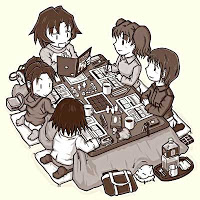There seem to be two schools of thought regarding how RPG campaigns are organized.
The first holds that the campaign is an extension of a particular group of friends, who get together to share each others’ company and for whom the game is a reason to do so. In this conception, “the group” is a coherent whole and “the game” exists to serve its needs and the needs and/or desires of the members of the group. Thus, scheduling, venue, and the choice of game (and the role of game master) is determined by consensus of the group.
The second holds that the campaign is an end unto itself. The individual players assemble for the purpose of playing the game, and thus the roster of players may change from session to session or more gradually over time. This does not preclude some members forming (close) friendships, but such is secondary to the primary goal of playing the game. Thus, scheduling, venue, and the choice of game is determined by the game master, and those participants who are able and willing to play, do so as they will.
This can be a problem when the participants, or a subset of the participants, thinks they are playing one sort of campaign, and others think they’re playing another. The sort of campaign should be clear to all from the outset.










Our group is a mix of the two. While we are long time friends, we have also integrated blogger friends from on-line where we probably wouldn't have gotten to know each other except for the game. We take turns GMing. And the GM determines the campaign and ruleset. The constant is our playing day and time.
My group contains all kinds as well.
Love that cute image!
Both my monthly groups are a mix of these two descriptions. The group that gathers more casually meets regularly on the third Friday of each month, which is my choice as GM. The group that is more involved in the campaign-as-story and the game in general is the one that struggles for concensus on when to meet.